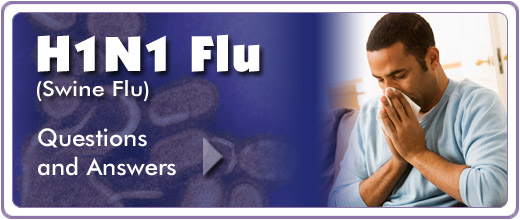The Illinois Department of Public Health reminds schools that novel influenza is a reportable illness.
Please report the following situations to your local health department for further follow-up:
- Absenteeism beyond what would be expected at this time of year at your school
- Febrile respiratory illness (see below) beyond what would be expected at this time of year at your school
Definitions of Respiratory Illness
Febrile respiratory illness
Fever or feverishness and recent onset of at least one of the following:
- rhinorrhea or nasal congestion
- sore throat
- cough
School Dismissal and Child Care Facility Closure
CDC no longer recommends that communities with a laboratory-confirmed case of influenza A H1N1 consider adopting school dismissal or childcare closure measures. Rather, CDC has modified its policy to recommend implementation of measures that focus on keeping all student, faculty and staff with symptoms of influenza out of schools and childcare facilities during their period of illness and recuperation, when they are potentially infectious to others.
CDC Guidance for State and Local Public Health Officials and School Administrators for School (K-12) Responses to Influenza during the 2009-2010 School Year
Technical Report for State and Local Public Health Officials and School Administrators on CDC Guidance for School (K-12) Responses to Influenza during the 2009-2010 School Year
Preparing for the Flu: A Communication Toolkit for Schools (Grades K-12)
For post secondary institutions of higher education, CDC recommends:
H1N1 Flu (Swine Flu) Infections Alert for Institutions of Higher Education
Interim CDC Guidance for Colleges, Universities, and Post-secondary Educational Institutions in Response to Human Infections with Novel Influenza A (H1N1) Virus
Recommendations for Infection Control in School Settings
Parents should be advised to keep their children home if they become sick with flu-like symptoms and to notify their school principal of the child’s absence. Parents should contact their health care providers if their children have symptoms consistent with influenza.
Schools play a vital role in the process to prevent disease within their communities. Because there is no vaccine available right now to protect against swine influenza, it is important to emphasize the importance of everyday actions that can help prevent the spread of germs that cause respiratory illnesses like influenza. Students, parents and faculty should take these everyday steps to protect their health:
- Cover your nose and mouth with a tissue when you cough or sneeze. Throw the tissue in the trash after you use it. Cover your nose and mouth with your sleeve if you do not have a tissue.
- Wash your hands often with soap and water, especially after you cough or sneeze. Alcohol-based hand cleaners also are effective.
- Try to avoid close contact with sick people.
If you are sick, you should stay home and avoid contact with other people as much as possible to keep from spreading your illness to others. If you become ill and experience any of the following warning signs, seek emergency medical care.
In children, emergency warning signs that need urgent medical attention include:
- Fast breathing or trouble breathing
- Bluish skin color
- Not drinking enough fluids
- Not waking up or not interacting
- Being so irritable that the child does not want to be held
- Flu-like symptoms improve but then return with fever and worse cough
- Fever with a rash
In adults, emergency warning signs that need urgent medical attention include:
- Difficulty breathing or shortness of breath
- Pain or pressure in the chest or abdomen
- Sudden dizziness
- Confusion
- Severe or persistent vomiting
Stopping the Spread of Germs at Home, Work and School - CDC
Seasonal Flu Information for Schools and Childcare Providers - CDC
Stopping Germs at Home, Work and School - CDC
|


